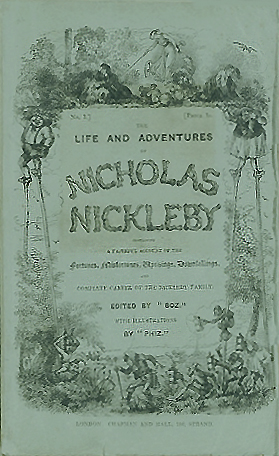
Nicholas Nickleby
Nicholas Nickleby, or The Life and Adventures of Nicholas Nickleby, is the third novel by Charles Dickens, originally published as a serial from 1838 to 1839. The character of Nickleby is a young man who must support his mother and sister after his father dies.
For other uses, see Nicholas Nickleby (disambiguation).Author
The Life and Adventures of Nicholas Nickleby
England
English
Novel
Serialised March 1838 -October 1839; book format 1839
952 (first edition)
Background[edit]
The Life and Adventures of Nicholas Nickleby, Containing a Faithful Account of the Fortunes, Misfortunes, Uprisings, Downfallings, and Complete Career of the Nickleby Family[1] saw Dickens return to his favourite publishers and to the format that proved so successful with The Pickwick Papers. The story first appeared in monthly parts, after which it was issued in one volume. Dickens began writing Nickleby while still working on Oliver Twist.
Adaptations[edit]
Theatre[edit]
Nicholas Nickleby has been adapted for stage several times.
The 1838 play Nicholas Nickleby; or, Doings at Do-The-Boys Hall premièred at the Adelphi Theatre and City of London Theatre, and featured Mary Anne Keeley as Smike. This version actually appeared before the end of the novel had been published, and its resolution is wildly different from that of the finished novel. Dickens's offence at this plagiarism prompted him to have Nicholas encounter a "literary gentleman", to whom Nicholas delivers a lengthy and heated condemnation of the practice of adapting still-unfinished books without the author's permission.
An 1850s American version featured Joseph Jefferson as Newman Noggs; another in the late 19th century featured Nellie Farren as Smike.
The 1973 musical Smike is an adaptation focusing on the character Smike, written by Simon May, Clive Barnett and Roger Holman.
A large-scale theatrical production, The Life and Adventures of Nicholas Nickleby, by playwright David Edgar, premiered in 1980 in the West End by the Royal Shakespeare Company. It was a theatrical experience which lasted more than ten hours. Most of the actors played multiple roles because of the large number of characters. The play moved to Broadway in 1981.
In 2006 Edgar prepared a shorter version for a production at the Chichester Festival,[21] which transferred in December 2007 and January 2008 to the Gielgud Theatre in the West End.[22] This version has been produced in the US by the California Shakespeare Festival.[23]
Film and television[edit]
Film and television adaptations of Nicholas Nickleby include:
Analysis
Resources